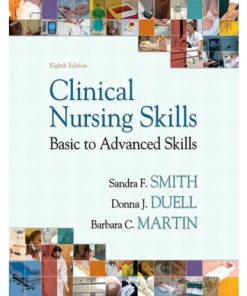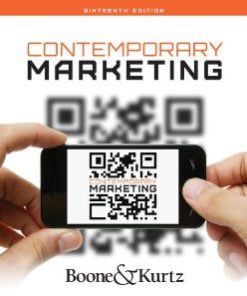Test Bank for Positive Psychology 4th Edition Lopez
$35.00 Original price was: $35.00.$26.50Current price is: $26.50.
Test Bank for Positive Psychology 4th Edition Lopez
Sell by: Riley West
SKU: uobkf970958
Category: Test Bank
This is completed downloadable of Test Bank for Positive Psychology 4th Edition Lopez

Product Details:
ISBN-13: 978-1506357355
Author: Shane J. Lopez (Author), Jennifer Teramoto Pedrotti (Author), Charles Richard Snyder (Author)
Positive Psychology: The Scientific and Practical Explorations of Human Strengths comprehensively covers the science and application of positive psychology. The book brings positive psychology to life by illustrating issues such as how psychological strength can help increase positive outcomes in school and the workplace and promote cooperative relationships among people. Furthermore, the book encourages readers to engage with concepts in order to understand positive emotions and strengths, such as empathy, altruism, gratitude, attachment, and love. Over 50 case studies grounded in practice, research, and the authors’ teaching experience reveal how positive psychological phenomena operate in the lives of real people. The Fourth Edition continues to integrate cultural context in every chapter to reflect the diversity in today’s world.
Table of Content:
- Part I Looking At Psychology from a Positive Perspective
- Chapter 1 Welcome to Positive Psychology
- Building Human Strength: Psychology’s Forgotten Mission
- Going From the Negative to the Positive
- A Positive Newspaper Story
- Reactions to This Positive Story
- Positive Psychology Seeks a Balanced, More Complete View of Human Functioning
- Views of Reality That Include Both the Positive and the Negative
- Where We Are Now and What We Will Ask
- Personal Mini-Experiments: What You Want to Experience
- A Guide to This Book
- Personal Mini-Experiments
- Life Enhancement Strategies
- The Big Picture
- Appendix: Movies for Review
- Key Terms
- Chapter 2 Eastern and Western Perspectives on Positive Psychology: How “ME + WE = US” Might Bridge the Gap
- A Matter of Perspective
- Historical and Philosophical Traditions
- Western Influences: Athenian, Judeo-Christian, Islamic, and Anishinaabe Traditions
- Athenian Views
- Judeo-Christianity
- Islam
- Anishinaabe Teachings
- Eastern Influences: Confucianism, Taoism, Buddhism, and Hinduism
- Confucianism
- Taoism
- Buddhism
- Hinduism
- Summary of Eastern and Western Philosophies
- East Meets West
- Individualism: The Psychology of ME
- A Brief History of American Individualism
- Emphases in Individualism
- Collectivism: The Psychology of WE
- A Historical Comment on Collectivism: We Came Together Out of Necessity
- Emphases in Collectivism
- Demographics Related to Collectivism
- The Stories We Tell
- Orientation to Time
- Thought Processes
- East and West: Is One Best?
- Personal Mini-Experiments: Getting and Giving Help
- Different Ways to Positive Outcomes
- “The Rugged Individualist” and the Construct of Hope
- The Need for Uniqueness
- Eastern Values: Compassion and Harmony
- Where We Are Going: From ME to WE to US
- ME/WE Balance: The Positive Psychology of US
- Both the Individualistic and the Collectivistic Perspectives Are Viable
- Thinking About Your Own Life
- Suggestions for ME People (Individualists)
- Suggestions for WE People (Collectivists)
- Final Thoughts
- Appendix: The Need for Uniqueness Scale
- Key Terms
- Chapter 3 Classifications and Measures of Strengths and Positive Outcomes
- Classifications and Measures of Strengths
- Gallup’s Clifton StrengthsFinder
- The VIA Classification of Strengths
- The Search Institute’s 40 Developmental Assets
- Distinguishing Among the Measures of Psychological Strength
- Issues of Equivalence in Using Measures of Psychological Strength
- Identifying Your Personal Strengths
- Personal Mini-Experiments: Discovering and Capitalizing on Your Strengths
- The Case of Shane
- Positive Outcomes for All
- Dimensions of Well-Being
- Toward a Better Understanding of Positive Outcomes
- Identifying Strengths and Moving Toward a Vital Balance
- Note
- Key Terms
- Part II Positive Psychology in Context
- Chapter 4 The Role of Culture in Developing Strengths and Living Well
- Culture and Psychology
- Main Message: Culture Counts
- Understanding Culture: A Matter of Perspective
- Positive Psychology: Culture Is Everywhere
- Culturally Embedded Positive Psychology Research and Practice
- Personal Mini-Experiments: Culturally Embedded Daily Practice
- Situating Positive Psychology
- Putting Positive Psychology in a Cultural Context
- Examining the Equivalence of the “Positives” to Determine What Works
- Determining the Foundations of the Good Life
- Using Caution in Measuring “Universal” Strengths
- The Wise Man of the Gulf
- Multicultural Mindset as a Strength
- Final Thoughts on the Complexity of Cultural Influences
- Key Terms
- Chapter 5 Living Well at Every Stage of Life
- Resilience in Childhood
- The Case of Jackson
- What Is Resilience?
- The Roots of Resilience Research
- Resilience Resources
- An Excerpt From Finding Strength: How To Overcome Anything
- Positive Youth Development
- What Is Positive Youth Development?
- Positive Youth Development Programs That Work
- The Life Tasks of Adulthood
- The Trajectories of Precocious Children
- What Are the Primary Tasks of Adulthood?
- The Case of Keyonna
- Successful Aging
- What Is Successful Aging?
- The Case of Tony
- The MacArthur Foundation Study of Successful Aging
- The Adult Development Study
- One Man’s View of Aging
- Personal Mini-Experiments: Finding Amazing People of All Ages
- A More Developmental Focus in Positive Psychology
- Key Terms
- Part III Positive Emotional States and Processes
- Chapter 6 The Principles of Pleasure: Understanding Positive Affect, Positive Emotions, Happiness, and Well-Being
- Defining Emotional Terms
- Affect
- Emotion
- Happiness
- Subjective Well-Being
- Distinguishing the Positive and the Negative
- The Positive and Negative Affect Schedule
- Positive Emotions: Expanding the Repertoire of Pleasure
- Personal Mini-Experiments: In Search of Joy and Lasting Happiness
- Positive Emotion Styles Linked to the Common Cold
- Happiness and Subjective Well-Being: Living a Pleasurable Life
- Age-Old Definitions of Happiness
- Subjective Well-Being as a Synonym for Happiness
- The Satisfaction With Life Scale
- Determinants of Subjective Well-Being
- Happiness + Meaning = Well-Being
- Twenty-First-Century Definitions of Happiness
- Excerpts From Authentic Happiness
- Happiest American is Still Hawaiian, Jewish And Chill
- Complete Mental Health: Emotional, Social, and Psychological Well-Being
- Increasing Happiness in Your Life
- Moving Toward the Positive
- Life Enhancement Strategies
- Key Terms
- Chapter 7 Making the Most of Emotional Experiences: Emotion-Focused Coping, Emotional Intelligence, Socioemotional Selectivity, and Emotional Storytelling
- Emotion-Focused Coping: Discovering the Adaptive Potential of Emotional Approach
- The Case of a Hurricane Survivor
- Emotional Intelligence: Learning the Skills That Make a Difference
- Who Is Emotionally Intelligent—And Does It Matter?
- Socioemotional Selectivity: Focusing in Later Life on Positive Emotions and Emotion-Related Goals
- Emotional Storytelling: The Pennebaker Paradigm as a Means of Processing Intense Negative Emotions
- Emotional Storytelling After a Traumatic Event
- Emotions and Context
- Working With Emotions to Bring About Positive Change
- Personal Mini-Experiments: Making the Most of Emotions in Everyday Life
- An Emotional Balancing Act
- Life Enhancement Strategies
- Key Terms
- Part IV Positive Cognitive States and Processes
- Chapter 8 Seeing our Futures Through Self-Efficacy, Optimism, and Hope
- Fascination With the Future
- Being Busy Not an End in Itself
- Self-Efficacy
- I Think I Can, I Think I Can …
- A Definition
- Childhood Antecedents: Where Does Self-Efficacy Come From?
- Cultural Context and Self-Efficacy
- The Neurobiology of Self-Efficacy
- Scales: Can Self-Efficacy Be Measured?
- Self-Efficacy’s Influence in Life Arenas
- The Latest Frontier: Collective Self-Efficacy
- Changing Behavior Through TV Heroes
- Optimism
- Learned Optimism—Seligman and Colleagues
- The CAVE and Predicting Baseball Outcomes
- Optimism—Scheier and Carver
- Hope
- A Definition
- Childhood Antecedents of Hope
- The Neurobiology of Hope
- Scales: Can Hope Be Measured?
- What Hope Predicts
- The Latest Frontier—Collective Hope
- Hope in Our Current Times
- Life Enhancement Strategies
- Putting Temporal Futures in Perspective
- Personal Mini-Experiments: Balancing Your Perspective on Time
- Cultural Caveats About Temporal Perspective
- Appendix A: A Summary of Hope Theories
- Appendix B: Zimbardo Time Perspective Inventory Items
- Note
- Key Terms
- Chapter 9 Wisdom and Courage: Characteristics of the Wise and the Brave
- Wisdom and Courage: Two of a Kind
- Wisdom Difficult to Define, Attain
- Theories of Wisdom
- Implicit Theories of Wisdom
- Explicit Theories of Wisdom
- Becoming and Being Wise
- Developing Wisdom
- Wise People and Their Characteristics
- The Measurement of Wisdom
- Benefits of Wisdom
- The Neurobiology of Wisdom
- Future Study of Wisdom
- Theories of Courage
- Implicit Theories of Courage
- Malala Yousafzai’s Courage The New York Times
- Amputee a Driving Force in Getting People With Disabilities Moving
- Becoming and Being Courageous
- U.S. Senator John McCain’s View on Strengthening Courage—April 2004
- Courage Research
- The Measurement of Courage
- Relationships Between Fear and Courage
- Neurological Factors in Courage
- Benefits of Courage
- Courage and Culture
- Finding Wisdom and Courage in Daily Life
- Can Courage Be Learned?
- Personal Mini-Experiments: In Search of the Wisdom and Courage of Everyday People … Including Yourself
- Life Enhancement Strategies
- The Value of Wisdom and Courage
- Key Terms
- Chapter 10 Mindfulness, Flow, and Spirituality: In Search of Optimal Experiences
- Moment-to-Moment Searches
- Mindfulness: In Search of Novelty
- Mindfulness as a State of Mind
- Living With Mindfulness: The Women’s Heart Foundation
- The Benefits of Mindfulness
- Neurological Findings With Mindfulness
- Cultivating Mindfulness
- Flow: In Search of Absorption
- Personal Mini-Experiments: In Search of Optimal Experiences
- The Flow State
- The Autotelic Personality
- Cultural Comparisons and Considerations in the Flow Experience
- Neurological Research on Flow
- Fostering Flow and Its Benefits
- New Areas of Investigation Involving Flow: Gaming and Internet Use
- Life Enhancement Strategies
- Spirituality: In Search of the Sacred
- The True Benefits of Spirituality?
- Spirituality and Cultural Context
- The Search Continues
- Key Terms
- Part V Prosocial Behavior
- Chapter 11 Empathy and Egotism: Portals to Altruism and Gratitude
- Altruism
- Defining Altruism
- The Egotism Motive
- Forms of Egotism-Motivated Altruism
- The Empathy Motive and the Empathy–Altruism Hypothesis
- Correlates of Altruism
- Genetic and Neural Foundations Related to Altruism Empathy
- Cultural Variations in Altruism
- Cultivating Altruism
- Personal Mini-Experiments: Exercises in Altruism and Gratitude
- Measuring Altruism
- Future Directions
- Gratitude
- Defining Gratitude
- Correlates of Gratitude
- Cultural Variations in Gratitude
- Cultivating Gratitude
- Thanking Your Heroes
- Measuring Gratitude
- The Psychophysiological Underpinnings of Gratitude
- The Societal Implications of Altruism and Gratitude
- Empathy/Egotism and Altruism
- Empathy/Egotism and Gratitude
- Life Enhancement Strategies
- “I Have a Dream”: Toward a Kinder, Gentler Humankind
- Appendix A: The Helping Attitude Scale
- Appendix B: The Gratitude Questionnaire—Six Items From GQ-6
- Key Terms
- Chapter 12 Attachment, Love, Flourishing Relationships, and Forgiveness
- Infant Attachment
- Personal Mini-Experiments: In Search of Love and Flourishing Relationships
- Adult Attachment Security
- Love
- Passionate and Companionate Aspects of Romantic Love
- The Triangular Theory of Love
- The Self-Expansion Theory of Romantic Love
- Flourishing Relationships: A Series of Purposeful Positive Relationship Behaviors
- Building a Mindful Relationship Connection
- Life Enhancement Strategies
- Creating a Culture of Appreciation
- A Lot of Love in the Lovemaking: Avoiding Chaos, Relationshipwise
- Capitalizing on Positive Events
- Praise: Encouraging Signs
- The Neurobiology of Interpersonal Connection
- More on Flourishing Relationships
- Future of Love
- When Loves Ends
- Forgiveness
- Defining Forgiveness
- Individual and Cultural Variations in Forgiveness
- Cultivating Forgiveness
- Measuring Forgiveness
- The Evolutionary and Neurobiological Bases of Forgiveness
- Physical Health and Forgiveness
- Attachment, Love, and Forgiveness: Building a Positive Psychology of Close Relationships
- Appendix A: The Heartland Forgiveness Scale (HFS)
- Appendix B: The Transgression-Related Interpersonal Motivations Scale (TRIM)
- Key Terms
- Part VI Understanding And Changing Human Behavior
- Chapter 13 Balanced Conceptualizations of Mental Health and Behavior
- Moving Toward Balanced Conceptualizations
- Our Fascination With Abnormal Behavior
- Neglect of the Environment and of the Positive
- Asking Questions: The Four-Front Approach
- The Case of Michael
- The Lack of a Developmental Emphasis
- Normalizing Negative and Positive Behavior
- The Case of Michael
- Difficulties Understanding Behavior in a Cultural Context
- Determining How “Culture Counts”
- The Case of Michael
- The Limits of the Categorical Diagnostic System
- Considering New Personality Dimensions
- The Case of Michael
- Going Beyond the DSM-5 Framework
- Attending to All Behavior
- Key Terms
- Chapter 14 Preventing the Bad and Promoting the Good
- In the Words of a Psychotherapy Client …
- Primary Prevention: “Stop the Bad Before It Happens”
- Is Primary Prevention Effective?
- Components of Effective Primary Preventions
- Head Start: An Example of Primary Prevention
- Primary Preventions for Children
- Primary Preventions for the Elderly
- Caveats About Primary Preventions
- Secondary Prevention (Psychotherapy): “Fix the Problem”
- Is Secondary Prevention Effective?
- Common Components of Secondary Preventions
- Secondary Prevention Programs for Adults
- Secondary Preventions for Racial and Ethnic Minorities
- Secondary Preventions for Children
- Secondary Preventions for the Elderly
- A Caveat About Secondary Preventions
- Primary Enhancement: “Make Life Good”
- Primary Enhancement: Psychological Health
- Primary Enhancement: Physical Health
- A Caveat About Primary Enhancement
- Secondary Enhancement: “Make Life the Best Possible”
- Secondary Enhancement: Psychological Health
- Personal Mini-Experiments: Enhancing Your Daily Life
- Secondary Enhancement: Physical Health
- Caveats About Secondary Enhancement
- The Balance of Prevention and Enhancement Systems
- Appendix A: Effective Secondary Preventions (Psychotherapies) for Adult Problems
- Appendix B: Hope Therapy Worksheet
- Key Terms
- Part VII Positive Environments
- Chapter 15 Positive Schooling and Good Work: The Psychology of Gainful Employment and the Education That Gets Us There
- Positive Schooling
- “Teachers Can’t Get Jobs in the Real World!”
- Negative Psychology: “Those Who Can’t, Shouldn’t Be Teaching”
- “No Child Left Behind” and Beyond
- Personal Mini-Experiments: The Power of Positive (and Negative) Teachers
- The Components of Positive Schooling
- Care, Trust, and Respect for Diversity
- Goals (Content)
- Plans
- Motivation (Plus Enlivening the Course Contents for Students)
- Hope
- Societal Contributions
- Teaching as a Calling
- 2016 National Teacher of the Year: “I Was a Teenage Mom, and Teachers Changed My Life”
- Giving Back to Teachers
- Gainful Employment
- Gainful Employment: Happiness, Satisfaction, and Beyond
- Performing Well and Meeting Goals
- Deriving Purpose by Providing a Product or Service
- Engagement and Involvement
- Variety in Job Duties
- Income for Family and Self
- Companionship and Loyalty to Coworkers and Bosses: Friends at Work
- Safe Work Environments
- Respect and Appreciation for Diversity in the Workplace
- Having or Being a Good Boss
- The Strengths-Based Approach to Work
- Match People, Don’t Fix Them
- The Stages of This Approach
- Does It Work?
- Capital at Work
- Traditional Economic Capital
- Human Capital
- Social Capital
- Positive Psychological Capital
- The Dark Side: Workaholics, Burnouts, and Jobs Lost
- Workaholics
- Burnout
- Losing Your Job
- What Can Be Done to Improve Your Work?
- Making the Job Better
- Personal Mini-Experiments: Becoming Gainfully Employed
- Applying for a New Job
- The Power to Change
- When Work Becomes a Calling: The Tale of a Hospital Orderly
- The Psychology of Gainful Employment and the Education That Gets Us There
- Appendix A: Example of Positive Schooling: The StrengthsQuest Program
- Appendix B: Positive Workplaces in Hong Kong: Building Positive Organizations, Engaging the Heart of Employees
- Key Terms
- Part VIII Finding Strengths in Others: Embodying Strengths in Everyday Life
- Chapter 16 Remembering Shane: Real Strengths in a Real Person
- “Strengths are all around you”
- “Strengths are also within you”
- “Strengths can be shared and borrowed”
- Remembering Shane J. Lopez
- Lisa M. Edwards, Marquette University
- Jeana L. Magyar, University of Wisconsin, Steven’s Point
- Heather Rasmussen, University of Kansas
- Danny Singley, The Center for Men’s Excellence
- Ryon McDermott, University of Alabama
- Cynthia Pury, Clemson University
- Kevin Rand, Indiana University–Purdue University Indianapolis
- Connie Clifton Rath, Gallup
- Barbara L. Fredrickson, University of North Carolina, Chapel Hill
- Sarah Pressman, University of California, Irvine
- Kristin Koetting O’Byrne, Abilene Christian University
- Matt Englar-Carlson, California State University, Fullerton
- Brian Cole, University of Kansas
- Matthew Gallagher, University of Houston
- Jennifer Teramoto Pedrotti, California Polytechnic State University
- References
- Glossary of Key Terms
- Author Index
- Subject Index
People Also Search:
positive psychology 4th edition lopez
positive psychology lopez 4th edition pdf free
positive psychology 4th edition pdf
Related products
Sale!
Sell by: Spencer Lowe
Sale!
Sell by: Jared Welch
Sale!
Sell by: Nora Patterson
Sale!
Sell by: Wesley Dennis
Sale!
Test Bank
Test Bank for Clinical Immunology and Serology A Laboratory Perspective, 3rd Edition: Stevens
Sell by: Joseph Carter
Sale!
Sell by: Michael Johnson
Sale!
Sell by: Scarlett Reed
Sale!
Sell by: Joshua Sanchez











